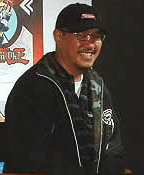A Quote by Stephen Jay Gould
The great merit of Stephen Gould's account of the disastrous history of phychometrics is that he shifts the argument from a sterile contest between environmentalists and hereditarians and turns it into an argument between those who are impressed with what our biology stops us doing and those who are impressed with what it allows us to do.
Related Quotes
The underlying struggle - between worlds of plenty and worlds of want; between the modern and the ancient; between those who embrace our teeming, colliding, irksome diversity, while still insisting on a set of values that binds us together, and those who would seek, under whatever flag or slogan or sacred text, a certainty and simplification that justifies cruelty toward those not like us.
Our lives are a battlefield on which is fought a continuous war between the forces that are pledged to confirm our humanity and those determined to dismantle it; those who strive to build a protective wall around it, and those who wish to pull it down; those who seek to mould it and those committed to breaking it up; those who aim to open our eyes, to make us see the light and look to tomorrow [...] and those who wish to lull us into closing our eyes
The argument for collectivism is simple if false; it is an immediate emotional argument. The argument for individualism is subtle and sophisticated; it is an indirect rational argument. And the emotional faculties are more highly developed in most men than the rational, paradoxically or especially even in those who regard themselves as intellectuals.
Constrained optimization is the art of compromise between conflicting objectives. This is what design is all about. To find fault with biological design - as Stephen Jay Gould regularly does - because it misses some idealized optimum is therefore gratuitous. Not knowing the objectives of the designer, Gould is in no position to say whether the designer has proposed a faulty compromise among those objectives.
They say that 'history is an argument without end.' In Thompson's skillful hands, this momentous argument between two old friends on the most critical issue of the last century is thus history at its best. Thompson's judicious and delicious depiction of Nitze and Kennan will fascinate anyone who cares about the Cold War or the ways that human beings shape the future.
The real differences around the world today are not between Jews and Arabs; Protestants and Catholics; Muslims, Croats, and Serbs. The real differences are between those who embrace peace and those who would destroy it. Between those who look to the future and those who cling to the past. Between those who open their arms and those who are determined to clench their fists.



































